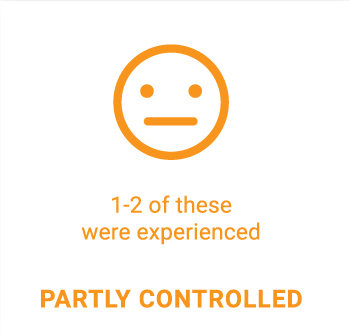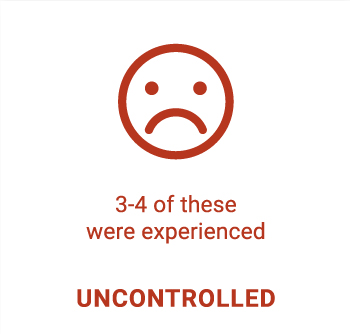Being in control of your condition can make you feel calmer and more at ease. When your asthma is well-controlled, you experience very few symptoms throughout the day and night and perform activities without shortness of breath, chest tightness, coughing or wheezing. Therefore It’s recommended that you monitor your symptoms daily.1
Tracking asthma symptoms is a key component to keeping asthma in good control. Knowing how much of what medicine to take, and when, is based on your symptoms.
Poorly controlled asthma increases your risk of an asthma attack (also known as an asthma flare-up or exacerbation).1 But remember, no matter how in control you are, asthma attacks can occur even in people taking asthma treatment.
When people suffering from mild asthma are asked whether their asthma is well controlled, less than 3% will consider their asthma as poorly controlled. But, when these people are tested with the appropriate tools, like the Asthma Control Test, it seems that 1 in 4 people are not well controlled.13
Controlled asthma goes beyond just not having symptoms. When we look at controlled asthma, we also look at whether your daily life is impaired by your asthma. For example, are you sleeping well, are you not participating in any normal activities due to your symptoms, are you using your reliever medication often and are there warning signs that your asthma may be more difficult to control in future (checking your lung function/peak flow regularly)?1, 14
Being in control of your condition can make you feel calmer and more at ease. When your asthma is well-controlled, you experience very few symptoms throughout the day and night and perform activities without shortness of breath, chest tightness, coughing or wheezing. Therefore It’s recommended that you monitor your symptoms daily.1
Tracking asthma symptoms is a key component to keeping asthma in good control. Knowing how much of what medicine to take, and when, is based on your symptoms.
Poorly controlled asthma increases your risk of an asthma attack (also known as an asthma flare-up or exacerbation).1 But remember, no matter how in control you are, asthma attacks can occur even in people taking asthma treatment.
When people suffering from mild asthma are asked whether their asthma is well controlled, less than 3% will consider their asthma as poorly controlled. But, when these people are tested with the appropriate tools, like the Asthma Control Test, it seems that 1 in 4 people are not well controlled.13
After the control of symptoms is checked, your doctor will also consider the risks or warning signs that your condition may be worsening, and you may experience more asthma attacks in the future. Your doctor will also look at whether you are using your medication regularly, and as prescribed, whether you are using your inhaler correctly (correct inhaler technique), how well your lung function is maintained and the impact of smoking (where relevant). Lastly, blood tests will be done to look for any signs of inflammation (high levels of white blood cells).
Some of the warning signs that you may have trouble controlling your asthma in future are up to you to change. Knowing what these are can help you improve your chances of keeping your asthma under control.
When we look at your asthma symptoms, an easy to use, quick tool to check your control is shown below.1, 14
Which of the following have you had in the past 4 weeks?



* Except reliever use before exercise
The Asthma Control Test is a more specialised test to determine how well your symptoms are controlled – see more below for more detail.
Life is already challenging for most people, yet enduring symptoms like wheezing, shortness of breath or a cough is not the biggest impact the condition can have on your life.
Many people complain about missing out on the “good things” in life like being able to participate in sports, completing normal daily tasks, going up stairs, going shopping, vacuuming, gardening etc.
But, there is also an emotional impact like feeling frustrated from not being able to do things, being scared and worried about the disease.
For children, the impact is very similar. What affects them greatly is that they feel excluded from their friends, leading them to feel angry, lonely, sad and frustrated.


The more informed you are about your condition, the better control you will have over your asthma symptoms. Please discuss a written Asthma Action Plan with your doctor, as this usually includes important information such as:3, 7
A written action plan is also very important for children suffering from asthma, and needs to be shared with caregivers/schools.3

We all lead very busy lives, and it could become so hectic that we sometimes forget what we had for dinner the night before. As an asthma sufferer, using your controller or reliever medication, or waking up at night may become routine, which is why it is important to make sure you record these signs carefully. This could help you to see patterns of symptoms or symptoms which may be slowly getting worse.
Keeping a basic daily Asthma Diary of your symptoms, daily activities and your peak flow score will help you to have a good view of how to complete the Asthma Control Test.
You can do so as a written diary you keep next to your bed and complete before sleep. There is also some easy to use Apps available for your smartphone to help you with keeping track of your symptoms.

The Asthma Control Test is a very helpful tool to help confirm if your asthma is well-controlled or not and helps you reach goals for asthma care. There are 2 Asthma Control Tests – one for adults and one for children (aged 4-11 years). The questions need to be completed (as appropriate for the patient’s age) once a month and the scores are added up so that you can discuss your progress with your doctor.15, 16
The adult test has 5 main questions: Assessing the time lost from work/school during the last 4 weeks, how often you had shortness of breath, how often your symptoms woke you up at night, how often you use your reliever medication, and how well you would rate your asthma control over the last month. Each question has 5 possible answers assigned with a score out of 5. A final score can vary from 5 (very poor control of asthma) to 25 (complete control of asthma).15
For children, 7 questions have been compiled, each with a score out of 4. A possible total score of 0-27 have been assigned.16
It is important to use an Asthma Control Test as part of your Asthma Management and always remember to take your test with you when you visit your doctor.